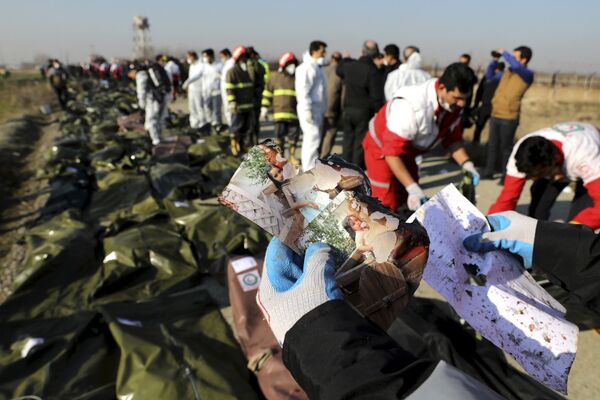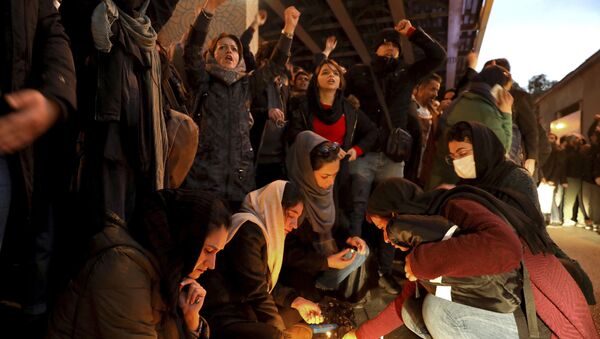Tehran responded late on Sunday to US President Donald Trump’s tweet in the Persian language, Farsi, expressing support for Saturday’s protests in Iran.
Iranian Foreign Ministry spokesman Abbas Mousavi said that the US president is not entitled to dishonor the ancient Persian language.
In a tweet on Sunday, he wrote:
“Hands and tongues smeared with threatening, sanctioning and terrorizing the #Iranian nation, are not entitled to dishonor the ancient #Persian_language. By the way, are you actually "standing by" millions of Iranians whose hero you just assassinated or "standing against" them?!”
Hands and tongues smeared with threatening, sanctioning and terrorising the #Iranian nation, are not entitled to dishonor the ancient #Persian_language.
— S.A MOUSAVI (@SAMOUSAVI9) January 12, 2020
By the way, are you actually "standing by" millions of Iranians whose hero you just assassinated or "standing against" them?! https://t.co/sfmT0qLXJq pic.twitter.com/6IwJL1uYUh
Meanwhile, Minister of Culture and Islamic Guidance Abbas Salehi tweeted that the Persian language is a symbol of Iranian culture, and attacked the hypocrisy of Trump’s first threatening to target Iran's cultural sites and then attempting to speak with Iranians in the Persian language.
شور و شعف ترامپ در توییت اخیر فارسیاش نمایان است.
— Seyyed Abbas Salehi (@S_A_Salehi) January 12, 2020
زبان فارسی نماد فرهنگ ایرانی است. تا دیروز تهدید مکرر اماکن فرهنگی ایران و امروز گفتگو با ایرانیان به زبان فارسی!
گرچه ما با هم اختلاف عقیده و سلیقه داریم، اما ترامپ نمدی بر نخواهد چید.
ملت ایران او را ناکام خواهند کرد.
Earlier, Donald Trump tweeted his support for Iranian protesters both in English and in Farsi after initially peaceful demonstrations in response to Iran's unintentional downing of a Ukrainian jet quickly took a violent turn.
On 12 January the US President tweeted:
“To the brave, long-suffering people of Iran: I've stood with you since the beginning of my Presidency, and my Administration will continue to stand with you. We are following your protests closely, and are inspired by your courage.”
To the brave, long-suffering people of Iran: I've stood with you since the beginning of my Presidency, and my Administration will continue to stand with you. We are following your protests closely, and are inspired by your courage.
— Donald J. Trump (@realDonaldTrump) January 11, 2020
به مردم شجاع و رنج کشیده ایران: من از ابتدای دوره ریاست جمهوریم با شما ایستادهام و دولت من همچنان با شما خواهد ایستاد. ما اعتراضات شما را از نزدیک دنبال می کنیم. شجاعت شما الهام بخش است.
— Donald J. Trump (@realDonaldTrump) January 11, 2020
Before that, Trump took to Twitter to warn the Iranian authorities against "killing protesters".
The government of Iran must allow human rights groups to monitor and report facts from the ground on the ongoing protests by the Iranian people. There can not be another massacre of peaceful protesters, nor an internet shutdown. The world is watching.
— Donald J. Trump (@realDonaldTrump) January 11, 2020
On Saturday, media reports emerged of protests in Iran against those responsible for the catastrophic accidental downing of a Ukrainian Airlines Boeing 737 that claimed the life of all 176 passengers and crew.

A peaceful gathering of hundreds of students outside the Amirkabir University of Technology in Tehran to honour those killed in the fatal crash resulted in a rally, with protesters calling for the ouster of senior government officials and demonstratively tearing down the portrait of slain Gen. Qasem Soleimani, killed in a US targeted drone strike on 3 January.
The jetliner crashed early Wednesday mere hours after Iran launched missile attacks on two Iraqi military bases housing American troops. The attacks were a response to the US airstrike that killed Iranian General Qasem Soleimani days earlier.
On Saturday, the Iranian Revolutionary Guard Corps admitted to downing Ukrainian Airlines Boeing 737 by mistake, confusing the plane with a cruise missile. Iran had previously maintained the incident was caused by technical error.
Iranian Foreign Minister Javad Zarif said the US’s decision to kill Iranian military commander Qassem Soleimani was a triggering point that led to the tragedy.
“Human error at time of crisis caused by US adventurism led to disaster,” he tweeted late Friday.
A sad day. Preliminary conclusions of internal investigation by Armed Forces:
— Javad Zarif (@JZarif) January 11, 2020
Human error at time of crisis caused by US adventurism led to disaster
Our profound regrets, apologies and condolences to our people, to the families of all victims, and to other affected nations.
💔


